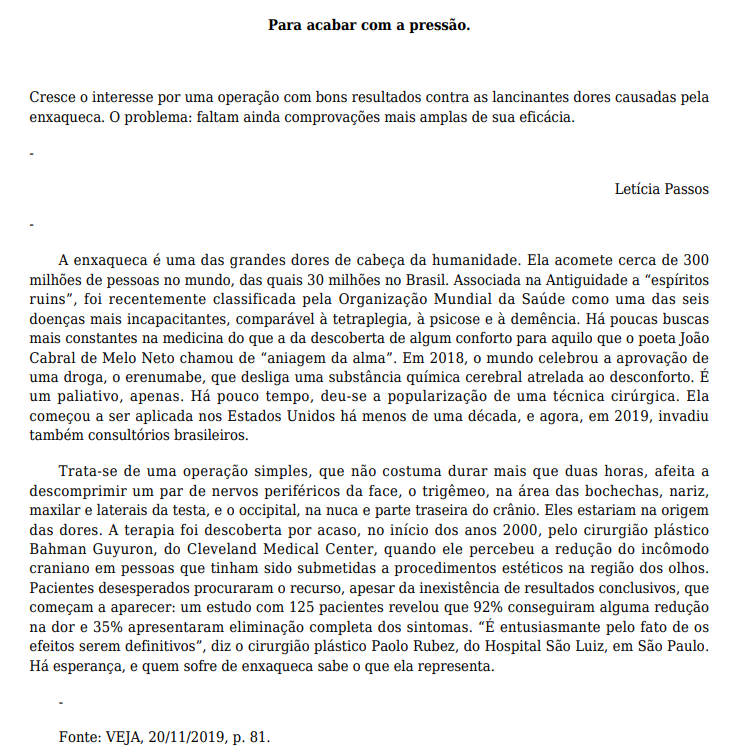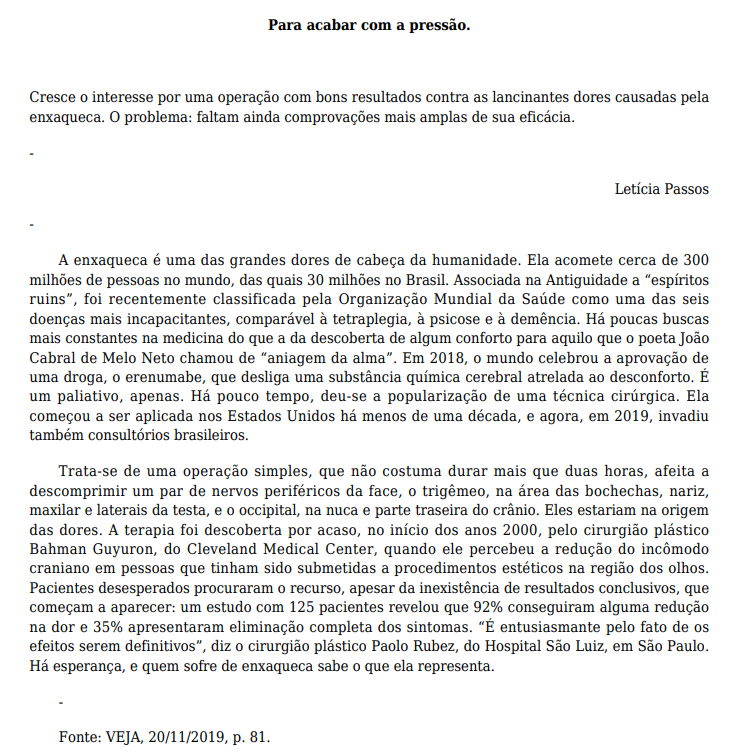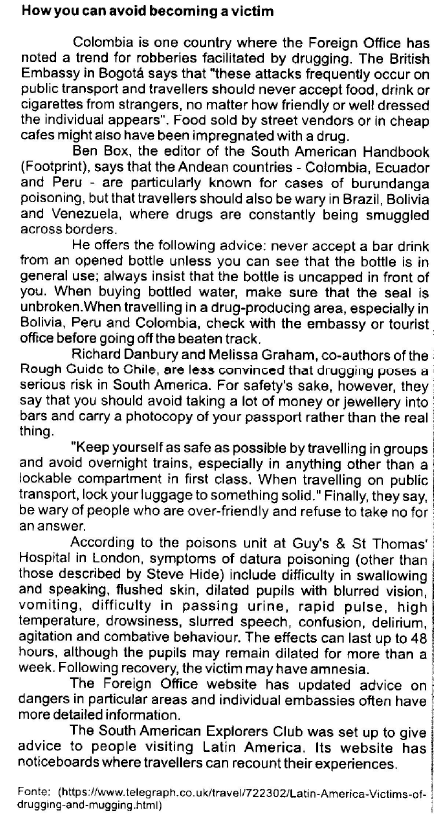Em: “Eles estariam na origem das dores.”, o pronome, usado anaforicamente no excerto, refere-se:
Sobre as estruturas:
-
1-“(... ) deu-se a popularização de uma técnica cirúrgica.”
2-“Trata-se de uma operação simples (...)"
-
E correto afirmar que:
De acordo com a teoria de Piaget, o conhecimento procede de:
Em um sistema operacional Windows 7, o uso do conjunto de teclas (teclas de atalho) WIN+L executa a seguinte ação:
A aceleração do processo de substituição das importações verificada no Brasil a partir da Segunda Guerra Mundial revelou que as economias externas do sudeste brasileiro já apresentavam condições para produzir um grande número de bens de consumo duráveis que até então eram importados.
Sobre este processo de substituição das importações, marque a alternativa correta.

In five years' driving buses for tour companies in Latin America, | had heard a lot of travellers' tales. Some of the most far-fetched were about people who had been befriended on the road, drugged, and then robbed of everything they were carrying.
There was the backpacker who "lost" four days after accepting a biscuit on a Bogotá night bus; he woke in hospital 800 miles away. “The bus wasn't even going there" is the twist in the tale. There was the traveller in Quito, Ecuador, who went for a quick drink and woke up, two days later, naked and in a strange apartment. And then, in an interesting variation, there was the Chilean diplomat who was caught smuggling cocaine on aninternational flightwhile in a deep trance.
The stories were gripping, but | never saw them as anything other than entertainment. The account was always second- or third-hand, the victim always "a friend of a friend".
Then, one night, in a Peruvian bar, the victim was me.
Iwas halfway through a sip of beer when | blanked out. It was as though someone had drawn a curtain across my conscious mind. Just as suddenly, | was conscious again, but
blind. | could hear voices. | had an incredible feeling of calm. Then |blanked out again. Luckily, friends got me safely back to the hotel. Next day, they gleefully explained the missing minutes from the night before: | had attacked a stranger at the bar, thrown punches, rolled about on the floor; then, in the taxi home, tried to clamber into the front seat and drive. | had needed restraining.
| listened aghast. | had no sense at all of having lost any time. My mind, like an old record player, had skipped a groove.
By chance, several days later, | met two traveliers who had visited the same Lima bar. The South African told me he had suddenly got dizzy a few sips into his first beer. He staggered outside, followed by some locals. His friends got to him first, ' hailed a taxi and took him home. The Dutch traveller told me that the barmaid had warned her of a gang that laces the drinks o tourists and then robs them outside.
The penny dropped: | was a burundanguiado. That is an Andean word for a victim of burundanga, a potent plant extract based on shamans' old potions. A tasteless yellow powder, it has a fearsome reputation in Colombia, the centre of druggings in South America.
It comes from the datura plants once used by the Chibcha people to sedate the wives and slaves buried alive with deceased chiefs. It is still used in remote areas by curanderos (healers) to induce a "waking trance" state, sometimes preceded by sudden outbursts of violence.
Burundanga can be added to food, drinks or cigarettes. In recent decades, its sinister use on the streets has grown from its role as a weapon in Colombia's gang wars. In Bogotá, hospital doctors say it accounts for half of all poisoning admissions, 500 permonth.
In other parts of the Andes, it is known as borrachera, |“drunken binge". Across the divide in Brazil, drugging crimes are charmingly called Boa noite, Cinderella - Goodnight, Cinderella - after a popular Seventies television show,
Crimes involving datura are also being reported in Ecuador, where it is used as a "recreational" drug, peddied by local guides to thrill-seeking tourists.
It was in Ecuador that | once witnessed the power of a vine called wantu. On the last night of a four-day jungle trip, our local guides brewed up a bitter potion they said was used by experienced shamans. They then talked half of our group of backpackers into drinking it.
Mayhem ensued. The jungle camp turned into a scene from Night of the Living Dead as the dozen or so imbibers crashed zombie-like through the undergrowth, while trying to tear up money or passports - not very successfully, because they had iostmostof their faculties, including eyesight.
Some lay in their hammocks having hallucinations about beasties. Others tottered towards the banks of the Rio Napo, a swift Amazon tributary that is no place to play blindman's buff. We shepherded them into a wooden hut and guarded them until dawn for their own safety.
The next day, our zombies had returned, partty, to the land of the fiving, although their eyesight was still a bit haywire (some stilt could not read their watch faces several days later). None could fully recall their antics of the night before and, iritatingly, they did not believe our version ofevents.
Wantu, like other datura-based drugs, contains a chemical called scopolamine, which has many legitimate medical uses and is cropped for pharmaceutical companies in South
America. Minute doses are used as a seasick cure, stronger ones in anaesthesia,
Scopolamine induces a dry mouth, disorientation, loss of vision, a hypnotic state and hallucinations. An overdose can cause heart failure. It also causes memory loss, which is seen as a benefit to patients undergoing surgery. That is less of a benefit to victims on the street, as Elliott Stares, a 26-year-oid Londoner, found when he and his brother were coerced to change hotels before being robbed by a "friendly" couple in Recife, Brazil.
“We met them for some drinks, but were quicklyrendered completely compliant to their will," he recalls. He remembers being in a bar, then has only glimpses of memory as the brothers were walked back to their hotel and told to collect their gear in readiness for a move to another hotel.
He now believes they were moved to make it easier to rob them. He has no memory of checking into the new hotel, but was later told by counter staff that he and his brother had seemed “drunk and dazed" when they arrived and had needed help from the Brazilian couple.
The brothers slept for 20 hours before waking in their strange lodgings. All their money and credit cards were gone. It took another day for them to get their senses together, says Stares, and through comparing notes and talking to hotel staff they managed to piece together the missing hours. "Sometimes things come back to me, fittie bites of information, but still most of the evening is vague.”
He remembers at one point the Brazilian woman giving him a glass of powdery water, while his brother was lying unconscious nearby. "The amazing thing was that | knew what was happening without even realising any danger. | just went along with it.”
This type of drugging is not exclusive to South America. Datura-type plants grow on most continents and have long been associated with druggings both in ritual and crime. Modern science has brought us more refined Mickey Finns such as Rohypnol, Halcion and GHB, chemical hypnotics used in "date rapes“in North America and occasionally turning up in Britain.
The Foreign Office says that embassies throughout the world have noticed a rise in drugging cases, but not enough to call a trend. “It's hard to say if the problem is growing or just being reported more, although it is wise to be alert to it," says a spokesman.
Any assessment of the risk is made more difficult by the entanglement of genuine cases with the fictional. Drugs such as burundanga are often a feature of that durable travellers' tale, "I woke up minus a kidney". Stories of organ theft, which proliferate through the internet, have been thoroughly debunked as modern myth (in one study by the UN, no less). They creep so often into mainstream media, however, that in New Orleans (often named as a city where travellers get separated from their body parts) the police department has threatened legal action against those who publish them. "These allegations are completely fictitious and a violation of criminal statutes concerning the issuance of erroneous and misleading information," says the city's Office of Public Affairs.
In other respects, the internet has been a positive force. Real victims of drugging have turned to it as a way to warn other travellers or to secure justice.
A German backpacker, who was drugged and sexually assaulted by a guide on a jungle tour in Rurrenabaque, Bolivia, in 1998, publicised her ordeal on popular traveller internet sites, describing how in the aftermath she had met with "nothing but indifference from the local police and 'my' German embassy”.
Her report gained credibility when several other victims came forward. Warnings were posted inside guidebook covers and on hostel walls. Bolivian police eventually arrested the guide last December, but not before two more alleged attacks. He now faces multiple charges of rape and assault.
In some parts of the world, drugging is linked to sex tourism and the victims are reluctantto talk. Sometimes, they are silenced for good. In the Thai resort of Pattaya, police were called to investigate a spate of deaths from heart attack among men - more than could be explained by heatstroke, over-exertion and over-the-counter Viagra. In nine months, 45 male tourists had dropped dead. According to Thai newspapers, police arrested a gang of prostitutes who had been smearing a knock-out paste on
their breasts; they had been a bitover-zealous in the application.
For most of us, the risk of being drugged will arise in less compromising circumstances. The Foreign Office warns tourists to take particular care with their food and drinkin Brazil, India, the Philippines, Thailand, Malaysia, Turkey and the former Soviet countries. On Russian trains, the word is: "Don't accept any drinks from rail staff."
If you do fall victim, then the official advice is to tell the police and your nearest embassy or consulate as soon as possible. It might not be a good idea to return to your hotel or hostel. “There is a chance the druggers know where you are staying - they may even have copies of your keys - and you could be in continuing danger," says a Foreign Office spokesman.
The embassy itself can act as a temporary safe haven and help with lost tickets, passports and money. The Foreign Office is keen to hear of even minor incidents. H there is credible evidence of a persistent risk in an area, then it can instigate local inquiries and add warnings to its travel advisory bulletins.
Travellers sensibly avoiding the sleazy side of town should take care on buses and trains, and remember that there is no archetypal drugger. Last October, Peruvian police received a dozen reports of druggings by a "sweet middle-aged lady" handing out sweets to passengers on the night bus to Huaraz, a popular resort.
A whole Botivian family was in on the act on the longdistance bus from Argentina to Bolivia. “They were very friendly,” recalls their Danish victim, who passed out after accepting a sipof Fanta from grandmother. He woke to find the family and his bags gone. Across the Pacific, a couple's trip to Manila last year went awry after they met three "nice, well-educated and rich" Filipinos who invited them to go for a snack. Their after-lunch nap lasted 33 hours, during which £4,000 was wiped off their credit cards.
Such cases make for depressing reading. The offer of food or drink is a time-honoured expression of friendship in most parts ofthe world (especially on Russian trains) and fewtravellers would want to miss out on it completely. But, when in doubt, it may be better to say no than take a risk. In areas they regard as dangerous, many experienced travellers make a habit of drinking only from bottles or cans they have opened themselves. Given that so many druggings happen in bars, it is probably a good idea to ensure that when you have a night on the town it is with people you know and trust: go in a group and try to return together. If you do split up, make sure friends know where you are.
Fraser Devan, ffom London, says he owes his life to fellow backpackers who found him unconscious on his hotelroom floor 24 hours after his drink was spiked in a nightelub in
Bangkok. They got him to hospital, where he spent six days in intensive care.
His narrow escape has not dampened his enthusiasfmor travel or for Thailand. He is planning to return to Bangkok on his honeymoon in June - "and Fil be checking out that nightclub te see ifanything comes back to me”.

De acordo com o texto, “burundanguiado” é:
Na oração “Travelters sensibly avoiding the sleazy side of town should take care on buses and trains, and remember that there is no archetypal drugger”, “sleazy" significa:
Na oração “Keep yourself as safe as possible by travelling in groups and avoid overnight trains”, o termo “yourself” é um pronome:
Qual das alternativas seguintes não apresenta uma locução verbal da lingua inglesa?
João Cabral de Melo Neto, autor modernista, sofria de fortes dores de cabeça.
Ao usar a expressão “aniagem da alma” à patologia, o autor quis:
Em: “(...) erenumabe, que desliga uma substância química cerebral atrelada ao desconforto.”, é inadequado afirmar que:
O que é o Sistema de Avaliação da Educação Básica — SAEB?
Analise as duas assertivas sobre educação e inclusão (MEC, 2006) e a relação entre elas.
A concepção de educação inclusiva está fundamentada nos princípios do direito de todos à educação e valorização da diversidade humana para garantir o acesso de todos à escola e o atendimento às necessidades educacionais especiais dos alunos.
PORTANTO
Algumas crianças devem ser inseridas no contexto escolar e outras em classes especiais considerando suas condições físicas, intelectuais, sociais, emocionais e linguísticas.
Marque a alternativa correta:





